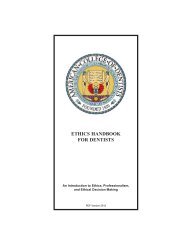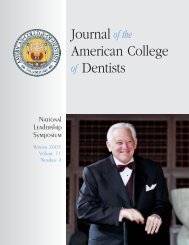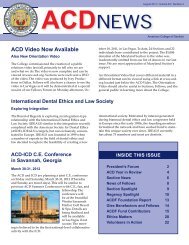Journal of the American College of Dentists
Journal of the American College of Dentists
Journal of the American College of Dentists
You also want an ePaper? Increase the reach of your titles
YUMPU automatically turns print PDFs into web optimized ePapers that Google loves.
Students’ Views on Ethics<br />
38<br />
believe that dental problems were readily<br />
treated with conventional imaging to a<br />
successful degree. For example, simple<br />
alternatives to <strong>the</strong> CBCT include a<br />
panoramic x-ray and lateral cephalograms<br />
taken at various stages <strong>of</strong> treatment.<br />
The only o<strong>the</strong>r possible alternative is<br />
refraining from all x- ray imaging and<br />
treatment altoge<strong>the</strong>r. Obviously each<br />
option has different ethical implications<br />
with respect to autonomy, beneficence,<br />
and maleficence. The patient receives<br />
no benefits from no treatment, but may<br />
receive partial benefit from older x-ray<br />
devices. It is also imperative to ask<br />
whe<strong>the</strong>r <strong>the</strong> dentist is confident in his<br />
or her ability to render treatment given<br />
<strong>the</strong> compromises <strong>the</strong> patient makes. A<br />
dentist can determine moral responsibility<br />
by weighing solely <strong>the</strong> consequences<br />
<strong>of</strong> actions, as <strong>the</strong> <strong>the</strong>ory <strong>of</strong> consequentialism<br />
suggests, deeming actions as<br />
morally right only if <strong>the</strong> consequences<br />
are more favorable than <strong>the</strong>y are unfavorable.<br />
Then, it is possible that certain<br />
alternatives, such as using a panoramic<br />
x-ray to place an implant into a severe<br />
lingual bony undercut, are too grave in<br />
prognosis to still provide service to<br />
patients because <strong>of</strong> <strong>the</strong> greater negative<br />
consequences <strong>of</strong> that action. The right<br />
choice in this situation, unlike <strong>the</strong> one in<br />
<strong>the</strong> superlative respect for autonomy, is<br />
indeed no treatment.<br />
Deciding what to do in a difficult<br />
clinical situation depends on <strong>the</strong> key<br />
players in <strong>the</strong> situation. If <strong>the</strong> dentist<br />
abides by an interactive relationship,<br />
<strong>the</strong>n he or she would place <strong>the</strong> value <strong>of</strong><br />
autonomy above all o<strong>the</strong>r ethical considerations<br />
(Ozar & Sokol, 2002). If <strong>the</strong><br />
patient is unable or unwilling to make a<br />
decision, <strong>the</strong>n <strong>the</strong> dentist can act on <strong>the</strong><br />
patient’s behalf and require a CBCT, or<br />
even refuse treatment without it, because<br />
such intervention can be justified on <strong>the</strong><br />
basis <strong>of</strong> preventing harm to someone<br />
who is unaware <strong>of</strong> it, a practice o<strong>the</strong>rwise<br />
known as paternalism. Still, ethical<br />
principles cannot provide solutions to<br />
every clinical dilemma, since emotional<br />
and real life factors may weigh heavier<br />
than <strong>the</strong> ethical constructs. Patients<br />
may have cultural or religious factors<br />
that deter <strong>the</strong>ir ability to act on moral<br />
considerations. Therefore, <strong>the</strong> discussion<br />
<strong>of</strong> all pertinent ethical issues cannot<br />
always lead to distinct right or wrong<br />
decisions, but ra<strong>the</strong>r is limited to <strong>the</strong><br />
moral implications <strong>of</strong> making such<br />
decisions (Hebert, 2009).<br />
Unlike <strong>the</strong> consequentialist <strong>the</strong>ory<br />
that determines moral responsibility<br />
on <strong>the</strong> sole basis <strong>of</strong> consequences, duty<br />
<strong>the</strong>ories view ethical behavior as an<br />
extension <strong>of</strong> certain obligations irrespective<br />
<strong>of</strong> <strong>the</strong> consequences that may follow.<br />
According to <strong>the</strong> seventeenth century<br />
German philosopher Pufendorf, <strong>the</strong><br />
scope <strong>of</strong> duties can be classified as<br />
those to God, to oneself, and to o<strong>the</strong>rs.<br />
Concerning those duties towards o<strong>the</strong>rs,<br />
he claimed that absolute duties are those<br />
that avoid wronging o<strong>the</strong>rs and promoting<br />
<strong>the</strong> good <strong>of</strong> o<strong>the</strong>rs, no matter <strong>the</strong><br />
ends <strong>of</strong> such actions. Then, if applied to<br />
<strong>the</strong> dilemma <strong>of</strong> routine CBCT scans in<br />
dental practice, we can argue that any<br />
dentist who is aware <strong>of</strong> <strong>the</strong> harmful<br />
effects <strong>of</strong> radiation is wrong in giving all<br />
patients a CBCT scan, even if such scans<br />
produce good consequences in some<br />
cases. In pure duty <strong>the</strong>ory, one should<br />
not harm a patient to justify any positive<br />
outcomes <strong>of</strong> that harm.<br />
Ano<strong>the</strong>r framework for this discussion<br />
comes from virtue <strong>the</strong>ories popularized<br />
by philosophers such as Aristotle, who<br />
believed that developing good character<br />
traits early on determines ethical actions<br />
in <strong>the</strong> future. Ra<strong>the</strong>r than following<br />
rules <strong>of</strong> ethics, an individual who learns<br />
from moral education will act on moral<br />
principles when confronted with an<br />
ethical dilemma. A dentist, <strong>the</strong>n, could<br />
rely on virtues like justice and honesty in<br />
<strong>the</strong> decision-making process regarding<br />
<strong>the</strong> CBCT scan, which may lead to<br />
different conclusions about <strong>the</strong> need for<br />
CBCT scans in <strong>the</strong> face <strong>of</strong> adequate and<br />
safer technology. For example, ra<strong>the</strong>r<br />
than setting rules for which patients<br />
and which cases necessitate additional<br />
scanning, <strong>the</strong> dentist can act benevolently<br />
in every situation to promote <strong>the</strong> virtue<br />
<strong>of</strong> honesty. This means that truth-telling<br />
takes precedence over <strong>the</strong> need to<br />
produce better treatment outcomes.<br />
Similar to this principle is <strong>the</strong> belief <strong>of</strong><br />
<strong>the</strong> eighteenth-century philosopher<br />
Immanuel Kant that lying is always<br />
wrong no matter <strong>the</strong> benefit it produces<br />
(Hebert, 2009). In modern clinical practice,<br />
this has not always been an easy<br />
task, especially when truth-telling to<br />
patients is rarely black and white. When<br />
diagnosis, prognosis, and potential<br />
effects <strong>of</strong> treatments are uncertain,<br />
clinicians may opt for <strong>the</strong> <strong>the</strong>rapeutic<br />
“white lie” in order to fulfill wishes <strong>of</strong><br />
patients such as maintaining hope. In<br />
this specific case, however, truth-telling<br />
applies to <strong>the</strong> full disclosure <strong>of</strong> risk<br />
ra<strong>the</strong>r than <strong>the</strong> omission <strong>of</strong> irreversible<br />
harm. Patients do have <strong>the</strong> power to<br />
change <strong>the</strong> fate <strong>of</strong> such accumulated<br />
risks, and thus, should be provided <strong>the</strong><br />
means to do so. It is a weak argument<br />
20 years from now to say that a correctly<br />
aligned implant (positive outcome) was<br />
worth a consequent cancer <strong>of</strong> some<br />
form (negative outcome). Kant’s proponents<br />
<strong>the</strong>refore dismiss consequences<br />
<strong>of</strong> behavior altoge<strong>the</strong>r and instead<br />
place emphasis on acting according to<br />
universal law.<br />
Whe<strong>the</strong>r an emphasis on duty or<br />
consequences gives <strong>the</strong> best account <strong>of</strong><br />
morality remains to be established, but<br />
2011 Volume 78, Number 4





